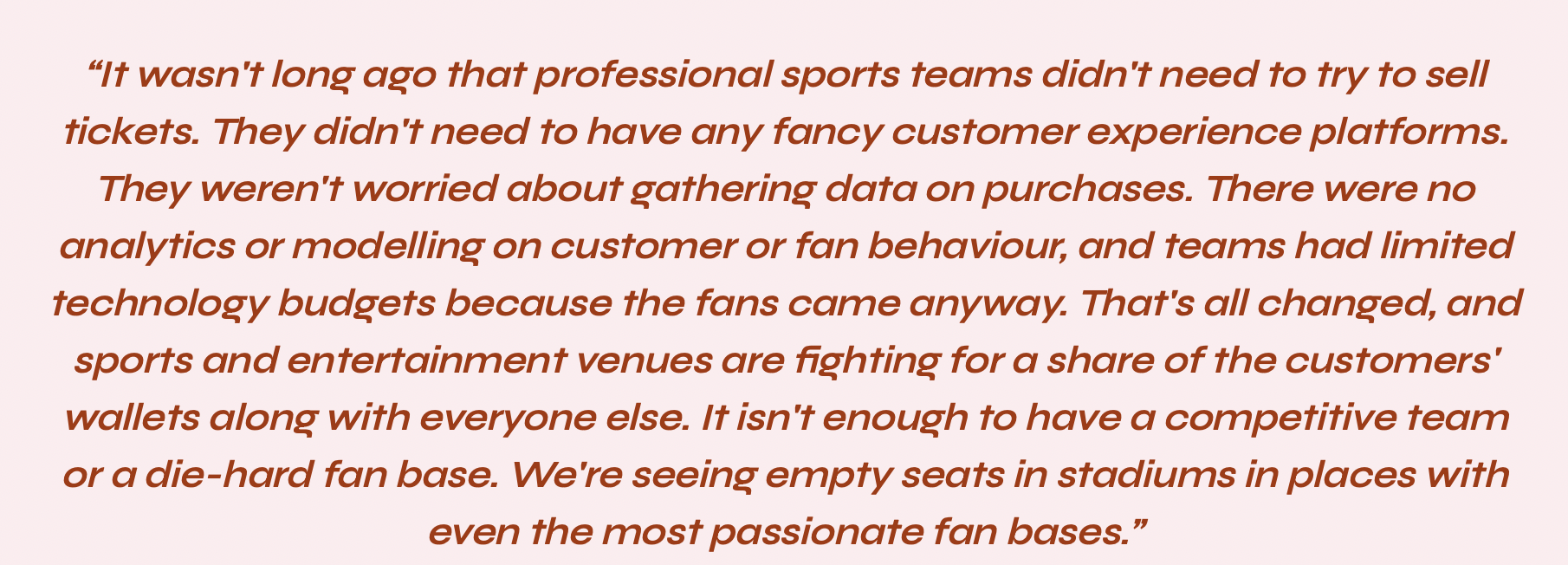
In today's environment, data holds the utmost significance. It influences decisions, shapes strategies, and advances industries.
The sports and entertainment sectors, however, have been reluctant to see the potential of data. So what is the issue here? Not enough specifics regarding the customers have been provided. Without a deep understanding of the preferences, behaviours, and demographics of their audience, sports and entertainment companies struggle to effectively target their marketing efforts and tailor their offerings. By harnessing the power of data analytics, these industries can gain valuable insights that enable them to make data-driven decisions, enhance fan experiences, and maximise revenue opportunities.
This article examines the issue at hand more closely, drawing conclusions about its ramifications and offering some suggestions for fixing it.
The sports and entertainment industry generates multiple billions of dollars annually and thrives on the participation of fans and the contentment of customers. Nevertheless, in spite of the vast resources and influence it possesses, this sector is confronted with a significant obstacle, namely a dearth of concrete customer data.

Understanding the Challenge
The challenge lies in the fact that while these industries have access to a wealth of data, they often struggle to convert it into actionable insights. This is due to several factors, including the lack of standardised data collection methods, the sheer volume of data, and the difficulty in accurately interpreting and applying this data. Additionally, the fast-paced nature of these industries adds another layer of complexity, as decisions often need to be made in real-time. Moreover, the constant evolution of technology and data analytics tools further complicates the process, requiring organisations to constantly adapt and upgrade their systems to stay ahead.
Insights from data enable companies to deliver concrete benefits to fans and consumers, including forecasting, personalization, and content recommendations. However, the lack of concrete data often hinders these benefits. Without access to accurate and reliable data, companies may struggle to make informed decisions and miss out on valuable growth opportunities. Additionally, the absence of concrete data can also lead to a disconnect between companies and their target audience, resulting in ineffective marketing strategies and a loss of customer trust.
The importance of data quality
The quality of the data is also a crucial factor. Poor data quality can lead to inaccurate analysis and flawed decision-making. Inaccurate or incomplete data can result in misleading insights and hinder the ability to identify trends or patterns. It is essential for companies to prioritise data quality through proper collection, validation, and maintenance processes to ensure reliable and meaningful information for effective decision-making.
It's also important to respect your customers while collecting data. This means being transparent about the data you are collecting, obtaining proper consent, and ensuring that customer privacy is protected. Respecting your customers' data rights builds trust and strengthens the relationship between businesses and their customers. Additionally, implementing strong data security measures can help prevent unauthorised access or breaches, further safeguarding customer information.
Using Web3 to fix data collection
Web3 technology provides a game-changing method of data collection that is trustworthy, open, and cognizant of the user's right to determine what happens to their information. It has the potential to revolutionise the data collection industry.
Sports and entertainment companies can now create unique digital tokens that users can outright own. They can be anything from exclusive event tickets to virtual merchandise or even shares in a team or artist. This not only enhances fan engagement but also opens up new revenue streams for these companies. With Web3, the possibilities for creating personalised and immersive experiences in the sports and entertainment industries are endless.
These tokens, usually created in the shape of NFTs, can also serve as memorabilia for fans to collect and trade. By leveraging blockchain technology, these tokens provide a secure and transparent way to authenticate and verify the ownership of digital assets. This not only adds value to the fan experience but also creates a new market for rare and limited-edition items. Additionally, the ability to track the history and provenance of these tokens can further increase their appeal and value in the long run.
From unique digital objects to special experiences
What Crowdclass can do for sports and entertainment clubs and companies is engineer the entire experience. From creating the digital assets themselves and curating the experience to managing the distribution and sale of these digital assets. By leveraging blockchain technology, Crowdclass ensures the authenticity and scarcity of these digital assets, making them highly sought after by fans and collectors alike. Furthermore, Crowdclass's platform allows for seamless integration with existing ticketing systems, providing a streamlined process for fans to access these unique digital objects or special experiences.
Data collection also becomes a breeze with Crowdclass since these unique experiences will provide an excellent and transparent incentive for fans and customers to trust you with their personal information. By offering exclusive digital assets and special experiences, Crowdclass creates a mutually beneficial relationship where fans willingly share their data in exchange for access to these highly desirable offerings. This not only helps businesses gather valuable customer insights but also strengthens the bond between them and their loyal fanbase.
Are you ready for the future of fan engagement?
